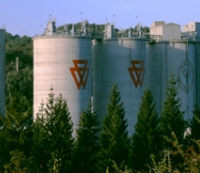Portland Valderrivas commits to a sustainable development model

Kiefer stated that, despite adverse circumstances, the company maintained an EBITDA margin of 28%, obtained a cash flow of 305 million euro, reduced capex and achieved recurring savings of 71 million euro.
He also underlined two significant transactions performed in 2009 with a view to strengthening the group's financial structure: the sale of holdings in Argentina and Uruguay (137 million euro) and the capital increase (202 million euro).
Kiefer was optimistic about 2010 projections in view of market performance as from the second half of March and in April and May. He noted that the group will exit the crisis in a better position due to its strategy of achieving recurring savings envisaged in Plan 100+ (to exceed 100 million euro) and to maximising cash flow net of capital expenditure to over 200 million euro, with strict control over capex and working capital. However, impacts from the Spanish government's recently-announced measures will have to be taken into account.
Resolutions adopted by the General Meeting included a dividend of 0.32 euro per share charged to 2009 income, i.e. a 50% payout. Cementos Portland Valderrivas is part of the Ibex Top Dividendo Index.
Concrete roads
Following its use in several highways built during the 1980s, concrete paving has been abandoned in Spain. Cementos Portland Valderrivas is in the process of resurfacing flexible asphalt agglomerate roads with rigid concrete pavement. This initiative, which has government approval, will open a new niche market for the cement industry.
The implementation of rigid concrete pavement in many countries, new technologies in the field, and the indisputable advantages of lowering oil dependency, combating climate change, improving environmental quality, and exceptional durability of concrete pavement, led to the recent execution of pilot projects approved by Spain's central and regional governments.
The notable success of the pilot projects and the conviction on the part of several governments provides assurance that rigid concrete pavements will be used to build Spanish roads in the near future.
Plan 100+. Plan to save more than 100 million euro on a recurring basis
Kiefer emphasised that, responding to the crisis, the company had obtained recurring savings of over 80 million euro by the first quarter of 2010, suggesting that the company will attain its goal of over 100 million euro savings on an annualised basis, fulfilling the Plan 100+ objective. The Plan will be ongoing with a view to optimising the company's competitiveness.
Energy eco-efficiency measures
The group continued its energy recovery programme to replace fossil fuels with alternatives. The company maintains its goal of increasing the proportion to 30% by 2013. This will reduce costs and significantly decrease CO2 emissions, as well as adapting to the change in the production model that will be required to comply with emissions reductions approved by the European Union.
The company continues its plan to replace raw materials with alternatives, and it expects to exceed 250,000 tonnes/year in 2010, i.e. saving 2.5 million euro.
R&D and innovation
The company is making major efforts in a two-pronged R&D and innovation approach. It is developing new products, specifically nine types of cement, three of which have been tested on landmark buildings and are now commercially available. It is also developing competitive research projects to bid for public funding; they include, most notably, two CENIT projects under Spain's National Scientific Research, Development and Technological Innovation plan, and three Etorgay projects in the Basque Country.
It is also completing the preparations to establish a technology company whose purpose is to foster competitiveness in R&D and innovation, optimise investment in these areas, and take maximum advantage of existing tax breaks.
The Chairman of Portland Valderrivas concluded with a message of confidence in the future of the company, which has adapted to the current situation in the cement industry by adopting a clear strategy that will enable it to emerge stronger when the economy recovers. He also thanked all the shareholders, customers and suppliers and, very particularly, all the workers for their efforts to attain the company's goals, in pursuit of a model of sustainable development in the medium and long term.








